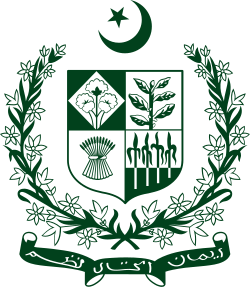| ||||||||||||||||||||||
50 of the 100 seats in the Senate 51 seats needed for a majority | ||||||||||||||||||||||
|---|---|---|---|---|---|---|---|---|---|---|---|---|---|---|---|---|---|---|---|---|---|---|
| ||||||||||||||||||||||
 | ||||||||||||||||||||||
| ||||||||||||||||||||||
 |
|---|
Senate elections were held in Pakistan on 3 March 2009. 50 of the 100 seats in the Senate were up for election with the winning candidates serving six-year terms.
| ||||||||||||||||||||||
50 of the 100 seats in the Senate 51 seats needed for a majority | ||||||||||||||||||||||
|---|---|---|---|---|---|---|---|---|---|---|---|---|---|---|---|---|---|---|---|---|---|---|
| ||||||||||||||||||||||
 | ||||||||||||||||||||||
| ||||||||||||||||||||||
 |
|---|
Senate elections were held in Pakistan on 3 March 2009. 50 of the 100 seats in the Senate were up for election with the winning candidates serving six-year terms.
| Party | Seats | |||||
|---|---|---|---|---|---|---|
| Won | Not up | Total | ||||
| Pakistan Peoples Party Parliamentarians | 22 | 5 | 27 | |||
| Pakistan Muslim League (Q) | 1 | 20 | 21 | |||
| Muttahida Majlis-e-Amal | 0 | 9 | 9 | |||
| Pakistan Muslim League (N) | 6 | 1 | 7 | |||
| Awami National Party | 5 | 1 | 6 | |||
| Mutahidda Qaumi Movement | 3 | 3 | 6 | |||
| Jamiat Ulema-e-Islam (F) | 3 | 1 | 4 | |||
| Balochistan National Party (Awami) | 1 | 1 | 2 | |||
| Jamhoori Wattan Party | 0 | 1 | 1 | |||
| National Party | 1 | 0 | 1 | |||
| Pashtunkhwa Milli Awami Party | 0 | 1 | 1 | |||
| Pakistan Muslim League (F) | 0 | 1 | 1 | |||
| Pakistan People's Party | 0 | 1 | 1 | |||
| Independents | 8 | 5 | 13 | |||
| Total | 50 | 50 | 100 | |||
| Source: IPU | ||||||
The following are the results of the elections, by administrative division. [1]
| Punjab | |||||||
|---|---|---|---|---|---|---|---|
| Seat Type | Winners | ||||||
| General | Pervaiz Rashid (PML-N) | Raja Zafar-ul-Haq (PML-N) | Syed Zafar Ali Shah (PML-N) | Mushahid Ullah Khan (PML-N) | Jehangir Bader (PPP) | Malik Salah-ud-Din Dogar (PPP) | Shujaat Hussain (PML-Q) |
| Technocrat | Sajid Mir (PML-N) | Muhammad Kazim Khan (PPP) | |||||
| Women | Najma Hameed (PML-N) | Sughra Imam (PPP) | |||||
| Sindh | |||||||
|---|---|---|---|---|---|---|---|
| Seat Type | Winners | ||||||
| General | Maula Bakhsh Chandio (PPP) | Islamuddin Shaikh (PPP) | Gul Muhammad Lot (PPP) | Faisal Raza Abidi (PPP) | Asim Hussain (PPP) | Babar Khan Ghauri (MQM) | Abdul Haseeb Khan (MQM) |
| Technocrat | Farooq Naek (PPP) | Rehman Malik (PPP) | |||||
| Women | Almas Parveen (PPP) | Shirala Mallick (MQM) | |||||
| Khyber Pakhtunkhwa | |||||||
|---|---|---|---|---|---|---|---|
| Seat Type | Winners | ||||||
| General | Zahid Khan (ANP) | Abdul Nabi Bangash (ANP) | Haji Muhammad Adeel (ANP) | Gulzar Ahmed Khan (PPP) | Waqar Ahmed Khan (PPP) | Sardar Ali Khan (PPP) | Haji Ghulam Ali (JUI-F) |
| Technocrat | Afrasiab Khattak (ANP) | Adnan Khan (PPP) | |||||
| Women | Farah Aqil (ANP) | Farhat Abbas (PPP) | |||||
| Balochistan | |||||||
|---|---|---|---|---|---|---|---|
| Seat Type | Winners | ||||||
| General | Nawabzada Muhammad Akbar Magsi (IND) | Mir Wali Muhammad Badini (IND) | Sabir Ali Baloch (PPP) | Lashkari Raisani (PPP) | Muhammad Khan Sherani (JUI-F) | Mir Muhammad Ali Rind (BNP-A) | Hasil Bizenjo (NP) |
| Technocrat | Humayun Khan Mandokhel (IND) | Abdul Ghafoor Haideri (JUI-F) | |||||
| Women | Kalsoom Perveen (IND) | Suriya Amiruddin (PPP) | |||||
| FATA | ||||
|---|---|---|---|---|
| Seat Type | Winners | |||
| General | Abbas Khan Afridi (Independent) | Haji Khan Afridi (Independent) | Muhammad Idrees Khan Safi (Independent) | Malik Rashid Ahmed Khan (Independent) |
| ICT | |
|---|---|
| Seat Type | Winners |
| General | Nayyar Hussain Bukhari (PPP) |
| Women | Saeeda Iqbal (PPP) |
After the election, on 13 March 2006, Farooq Naek of the ruling Pakistan People's Party (PPP) was elected to the position of Chairman unopposed. He replaced Muhammad Mian Soomro of the Pakistan Muslim League (Q) (PML(Q)). On the same day, Jan Mohammad Jamali of the PML(Q) was re-elected to the position of Deputy Chairman unopposed. [2]
On 9 March 2006, Raza Rabbani of the PPP, the incumbent Leader of the House, resigned from his position in protest of Naek's nomination to the chairmanship by the PPP. [2] On 17 April 2006, he was replaced by Nayyar Hussain Bukhari, also of the PPP. On the same day, Wasim Sajjad of the PML-Q was appointed as the Leader of the Opposition. [3]